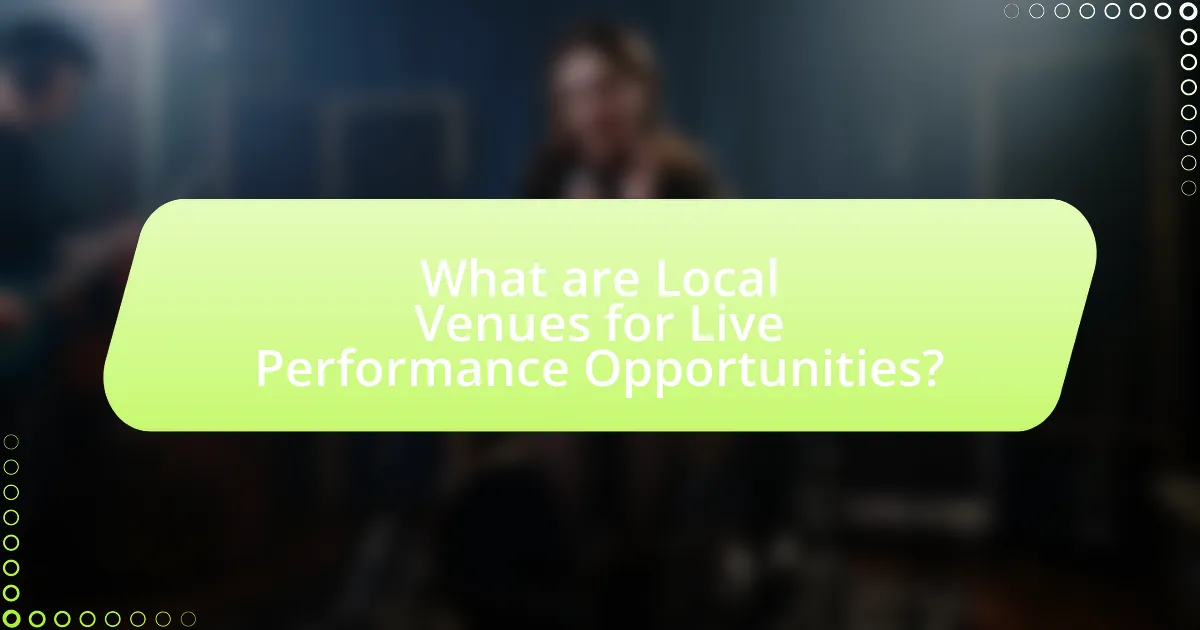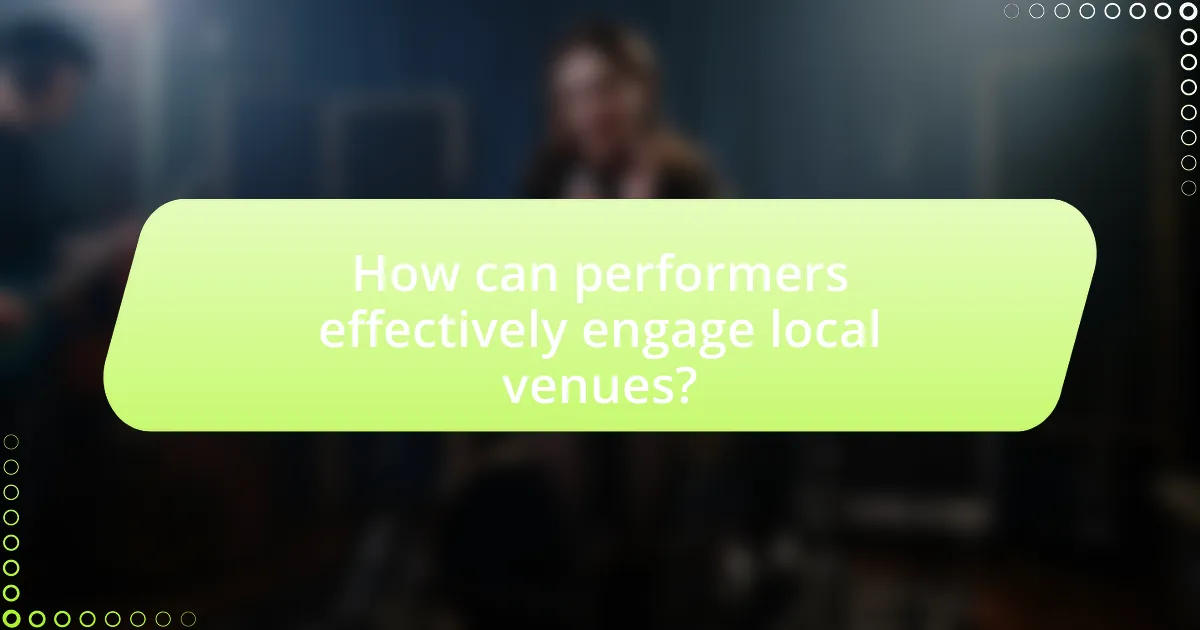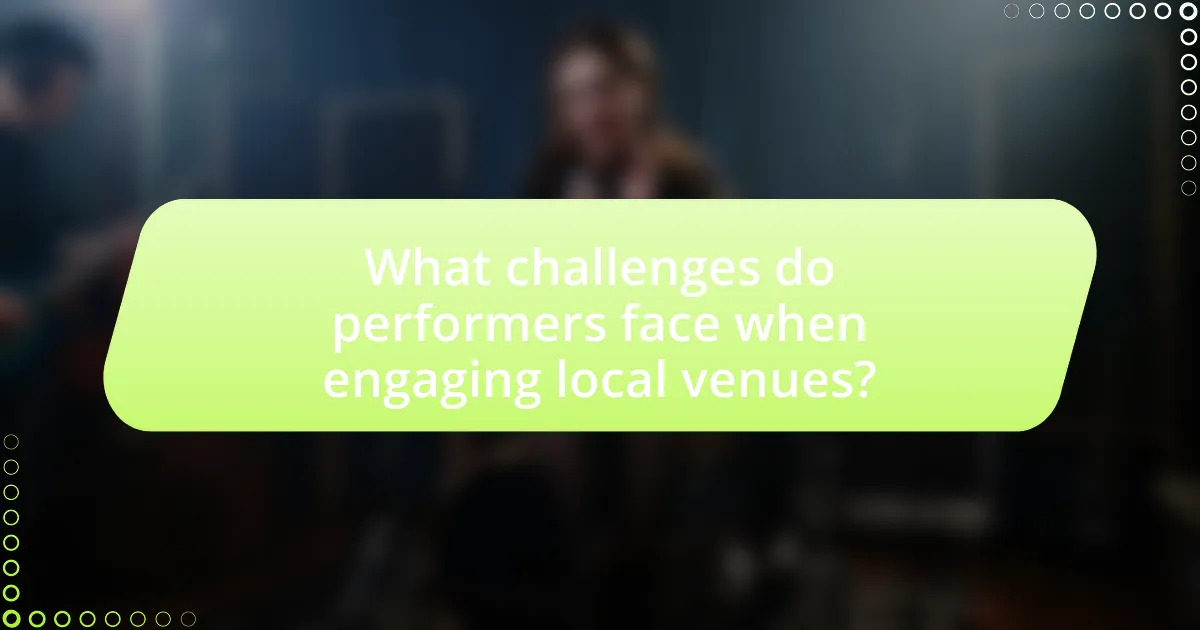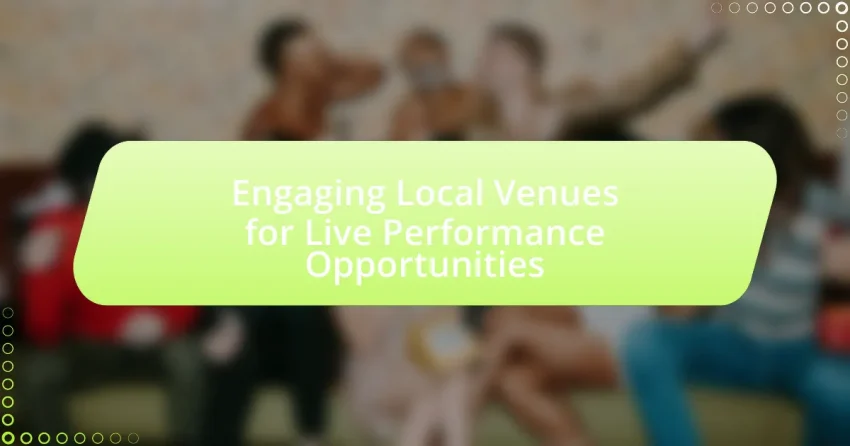The article focuses on engaging local venues for live performance opportunities, highlighting the importance of theaters, music clubs, community centers, and outdoor spaces in supporting artists. It discusses the differences between local and larger performance spaces, the types of venues available, and how venue capacities impact performance opportunities. Additionally, the article emphasizes the significance of networking, relationship-building, and effective communication for performers to secure gigs and enhance community engagement. It also addresses challenges faced by artists and provides practical strategies for overcoming these obstacles while promoting performances effectively.

What are Local Venues for Live Performance Opportunities?
Local venues for live performance opportunities include theaters, music clubs, community centers, and outdoor spaces. These venues often host a variety of events such as concerts, theater productions, and open mic nights, providing artists with platforms to showcase their talents. For example, many cities have established music clubs that regularly feature local bands, while community centers may offer spaces for theater groups to perform. Additionally, outdoor festivals and events often utilize parks or public squares as venues, allowing for larger audiences and diverse performances. These venues play a crucial role in the local arts scene by supporting emerging artists and fostering community engagement through live performances.
How do local venues differ from larger performance spaces?
Local venues differ from larger performance spaces primarily in their scale and intimacy. Local venues typically host smaller audiences, allowing for a more personal connection between performers and attendees, while larger performance spaces accommodate significantly more people, often resulting in a more impersonal experience. For instance, local venues may seat anywhere from 50 to 500 patrons, fostering a close-knit atmosphere, whereas larger venues can host thousands, which can dilute the audience’s engagement with the performance. Additionally, local venues often feature diverse programming that reflects community interests, while larger spaces may prioritize commercially successful acts due to their higher operational costs.
What types of local venues are available for live performances?
Local venues for live performances include theaters, concert halls, bars, clubs, community centers, and outdoor spaces. Theaters often host plays and musicals, while concert halls are designed for music performances, accommodating larger audiences. Bars and clubs typically feature local bands and DJs, providing an intimate setting for live music. Community centers may offer space for various events, including performances by local artists. Outdoor spaces, such as parks and amphitheaters, are popular for festivals and concerts, allowing for larger crowds and a more casual atmosphere. Each type of venue serves a unique purpose and caters to different audience preferences, contributing to the local arts scene.
How do venue capacities impact performance opportunities?
Venue capacities directly influence performance opportunities by determining the number of attendees that can be accommodated, which affects ticket sales and revenue potential. Larger venues can host more significant events, attracting bigger acts and larger audiences, while smaller venues may focus on intimate performances that cater to niche markets. For instance, a venue with a capacity of 1,000 can generate higher ticket sales compared to a venue with a capacity of 100, thus providing more financial resources for artists and promoters. Additionally, the type of venue can shape the nature of the performance; larger venues often require more elaborate production setups, while smaller venues may allow for more personal interactions between performers and audiences. This dynamic illustrates how venue capacities not only dictate the scale of events but also influence the types of performances that can be successfully executed.
Why is engaging with local venues important for performers?
Engaging with local venues is crucial for performers because it provides essential opportunities for exposure and audience building. By performing at local venues, artists can connect directly with their community, fostering a loyal fan base that can lead to increased ticket sales and word-of-mouth promotion. Additionally, local venues often serve as platforms for networking with other artists and industry professionals, which can open doors to future collaborations and gigs. According to a study by the National Endowment for the Arts, local performances significantly enhance an artist’s visibility and can lead to a 30% increase in local audience engagement over time.
What advantages do local venues offer to emerging artists?
Local venues provide emerging artists with essential opportunities for exposure and community engagement. These venues often have lower barriers to entry compared to larger spaces, allowing new talent to perform in front of local audiences. Additionally, local venues foster connections between artists and their communities, which can lead to a loyal fan base. According to a study by the National Endowment for the Arts, local performances significantly contribute to an artist’s visibility and career development, as they often serve as a platform for networking with industry professionals and other artists.
How can local venues enhance community engagement through performances?
Local venues can enhance community engagement through performances by providing accessible spaces for diverse artistic expressions that reflect the community’s culture and interests. By hosting a variety of events, such as concerts, theater productions, and open mic nights, these venues foster social interaction and create a sense of belonging among residents. Research indicates that community-based performances can increase local participation by up to 30%, as they encourage collaboration among artists and audiences, thereby strengthening community ties. Additionally, venues that partner with local organizations and schools can further amplify engagement by involving residents in the planning and execution of events, ensuring that performances resonate with the community’s values and needs.

How can performers effectively engage local venues?
Performers can effectively engage local venues by building relationships with venue owners and managers through networking and consistent communication. Establishing a rapport allows performers to understand the venue’s needs and preferences, which can lead to tailored proposals that align with the venue’s programming. Additionally, showcasing a strong online presence, including social media engagement and a professional website, can attract the attention of venue operators. According to a survey by the National Independent Venue Association, 70% of venue owners prioritize artists who actively promote their shows, highlighting the importance of marketing efforts in securing performance opportunities.
What strategies can be used to approach local venues?
To approach local venues effectively, establish a clear communication strategy that includes personalized outreach, showcasing your unique value proposition, and leveraging existing relationships. Personalized outreach involves researching each venue to tailor your pitch, demonstrating an understanding of their audience and programming style. Showcasing your unique value proposition means clearly articulating what sets your performance apart, such as genre, audience engagement, or past successes. Leveraging existing relationships can enhance credibility; for instance, if you have connections with artists who have performed at the venue, mentioning them can build trust. These strategies are supported by industry practices that emphasize the importance of tailored communication and relationship-building in securing performance opportunities.
How should performers prepare their pitch to local venues?
Performers should prepare their pitch to local venues by crafting a concise and compelling proposal that highlights their unique talents and the value they bring to the venue. This includes detailing their performance style, audience engagement strategies, and any previous successful shows to demonstrate credibility. For instance, including statistics such as audience turnout from past performances can substantiate their appeal. Additionally, performers should research the venue’s target audience and tailor their pitch to align with the venue’s programming goals, ensuring relevance and increasing the likelihood of acceptance.
What materials are essential for a successful venue engagement?
Essential materials for a successful venue engagement include a detailed event proposal, promotional materials, technical specifications, and a clear contract. The event proposal outlines the concept, audience, and logistics, ensuring that the venue understands the event’s vision. Promotional materials, such as flyers and social media graphics, are crucial for marketing the event and attracting attendees. Technical specifications detail the sound, lighting, and stage requirements, which are vital for the venue to prepare adequately. A clear contract protects both parties by outlining responsibilities, payment terms, and cancellation policies, ensuring a smooth collaboration.
What role does networking play in engaging local venues?
Networking is essential for engaging local venues as it facilitates relationships between performers and venue owners, leading to increased opportunities for live performances. Through networking, artists can share their work, gain referrals, and build trust with venue managers, which is crucial for securing bookings. For instance, a study by the National Endowment for the Arts highlights that 70% of artists find performance opportunities through personal connections, underscoring the importance of networking in the arts community.
How can performers build relationships with venue owners and managers?
Performers can build relationships with venue owners and managers by consistently communicating and demonstrating professionalism. Regularly reaching out to venue owners through emails or social media, attending events at the venue, and expressing genuine interest in their programming can establish rapport. Additionally, showcasing a strong work ethic, reliability in fulfilling performance commitments, and maintaining a positive attitude during interactions can further solidify these relationships. According to a study by the National Endowment for the Arts, networking and relationship-building are crucial for artists seeking performance opportunities, highlighting the importance of personal connections in the arts community.
What networking events are beneficial for connecting with local venues?
Networking events that are beneficial for connecting with local venues include music festivals, industry conferences, and community arts fairs. These events provide opportunities for artists and venue owners to meet, collaborate, and discuss potential performances. For instance, music festivals often feature a variety of local acts and attract venue representatives looking for new talent, while industry conferences like South by Southwest (SXSW) facilitate networking among artists, promoters, and venue operators. Community arts fairs also allow local artists to showcase their work and engage directly with venue owners interested in hosting live performances.

What challenges do performers face when engaging local venues?
Performers face several challenges when engaging local venues, including competition for slots, financial constraints, and logistical issues. Competition arises from the high number of artists vying for limited performance opportunities, making it difficult for individual performers to secure gigs. Financial constraints often include low pay rates offered by venues, which may not cover the costs of travel, equipment, and promotion. Logistical issues can involve scheduling conflicts, inadequate technical support, or insufficient marketing efforts by the venue, which can hinder audience turnout. These challenges collectively impact a performer’s ability to successfully engage with local venues and sustain their careers.
How can performers overcome common obstacles in venue engagement?
Performers can overcome common obstacles in venue engagement by building strong relationships with venue owners and understanding their needs. Establishing clear communication helps performers align their goals with the venue’s objectives, which can lead to mutually beneficial arrangements. For instance, research indicates that venues often prioritize events that attract a specific audience demographic; thus, performers should tailor their proposals to demonstrate how their performances can draw in that audience. Additionally, offering flexible scheduling and promotional support can enhance the appeal of a performance, making it easier for venues to commit.
What are the typical barriers to entry for new performers?
Typical barriers to entry for new performers include lack of experience, limited access to resources, and insufficient networking opportunities. New performers often struggle to gain experience due to the competitive nature of the industry, which can lead to difficulties in securing gigs. Additionally, access to essential resources such as instruments, rehearsal spaces, and promotional materials can be limited, particularly for those without financial backing. Networking is crucial in the performance industry, and new performers may find it challenging to connect with established artists, venue owners, and industry professionals, which can hinder their ability to book performances and gain visibility.
How can performers address logistical challenges with local venues?
Performers can address logistical challenges with local venues by establishing clear communication and detailed planning. Effective communication ensures that both performers and venue managers understand expectations, schedules, and technical requirements. For instance, discussing load-in times, soundcheck schedules, and equipment needs in advance can prevent misunderstandings. Additionally, creating a comprehensive checklist that includes all logistical aspects, such as transportation, setup, and breakdown procedures, can streamline the process. Research indicates that 70% of event-related issues stem from poor communication, highlighting the importance of proactive engagement with venue staff to mitigate potential challenges.
What are the best practices for maintaining relationships with local venues?
The best practices for maintaining relationships with local venues include regular communication, mutual support, and collaboration on events. Establishing consistent communication helps to keep both parties informed about upcoming opportunities and changes, fostering a sense of partnership. Supporting the venue by promoting their events through social media or word-of-mouth enhances goodwill and strengthens the relationship. Collaborating on events, such as co-hosting performances or community activities, creates shared value and encourages ongoing engagement. These practices are validated by industry standards, which emphasize the importance of building long-term partnerships for sustained success in live performance opportunities.
How can performers ensure successful follow-ups after initial engagements?
Performers can ensure successful follow-ups after initial engagements by promptly reaching out to venue managers or contacts within 24 to 48 hours. This timely communication reinforces the performer’s interest and professionalism, making a positive impression. Additionally, performers should personalize their follow-up messages by referencing specific moments from the engagement, which demonstrates attentiveness and builds rapport. According to a study by the Harvard Business Review, timely follow-ups can increase the likelihood of securing future opportunities by up to 50%. By combining promptness with personalization, performers enhance their chances of establishing lasting relationships with local venues.
What feedback mechanisms can be established with local venues?
Local venues can establish feedback mechanisms through regular surveys, suggestion boxes, and direct communication channels. Surveys can be distributed after events to gather audience opinions on performance quality, venue experience, and overall satisfaction, allowing venues to quantify feedback and identify areas for improvement. Suggestion boxes placed in accessible locations enable patrons to provide anonymous feedback, fostering an open dialogue. Additionally, direct communication channels, such as social media platforms or dedicated email addresses, allow for real-time feedback and engagement, ensuring that venues can respond promptly to audience concerns and suggestions. These methods collectively enhance the relationship between venues and their patrons, leading to improved event offerings and customer satisfaction.
What practical tips can enhance engagement with local venues?
To enhance engagement with local venues, establish strong relationships through regular communication and collaboration. Venues benefit from partnerships that promote mutual interests, such as co-hosting events or cross-promoting on social media. Research indicates that venues with active community involvement see a 30% increase in attendance, demonstrating the effectiveness of local engagement strategies. Additionally, offering exclusive promotions or events tailored to the venue’s audience can further increase interest and participation.
How can performers leverage social media to connect with local venues?
Performers can leverage social media to connect with local venues by actively engaging with venue profiles, sharing their performances, and utilizing targeted advertising. Engaging with venue profiles involves liking, commenting, and sharing posts, which increases visibility and fosters relationships. Sharing performances on platforms like Instagram and Facebook showcases talent and attracts venue attention. Additionally, targeted advertising on these platforms can reach specific demographics, including venue owners and event organizers, enhancing the likelihood of securing performance opportunities. According to a 2021 survey by Eventbrite, 70% of event organizers use social media to discover new talent, highlighting its effectiveness in connecting performers with venues.
What are effective ways to promote performances at local venues?
Effective ways to promote performances at local venues include utilizing social media platforms, collaborating with local influencers, and engaging in community outreach. Social media platforms like Facebook and Instagram allow for targeted advertising and event promotion, reaching specific demographics interested in live performances. Collaborating with local influencers can amplify reach, as they often have established audiences that trust their recommendations. Community outreach, such as partnering with local businesses or organizations, can create cross-promotional opportunities, increasing visibility and attendance. According to a study by Eventbrite, 80% of event attendees discover events through social media, highlighting its effectiveness as a promotional tool.
